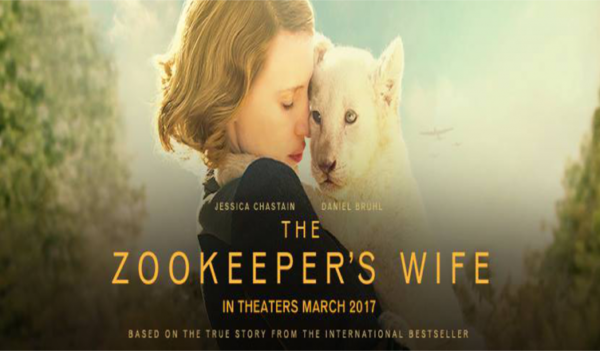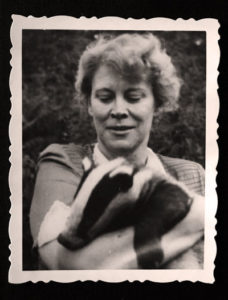 The Zookeeper’s Wife, the film about Polish rescuers Antonina Żabińska and her husband, Jan Żabiński, had many reviews. Some were positive but others were strangely negative. I use the word “strangely” for a reason: some reviewers simply did not like the story because it was not Schindler’s List.
The Zookeeper’s Wife, the film about Polish rescuers Antonina Żabińska and her husband, Jan Żabiński, had many reviews. Some were positive but others were strangely negative. I use the word “strangely” for a reason: some reviewers simply did not like the story because it was not Schindler’s List.
One reviewer, whose work I know, once found more complexities in love triangles than she could imagine in the 5-year occupation of a country by forces that were hardly more civilized than ISIS. Dismayed, perhaps, that the film’s focus is Antonina Żabińska, and not exclusively the Holocaust.
While it goes against conventional opinion to say this, the horror of the Holocaust is not the only horror of WWII, and although western Europe is permitted its stories of the Blitz, the Normandy landing and the Maquis, not so the people of eastern Europe. Some felt that rescuers, or “the righteous,” have been overdone. Far from it. In fact “the popular” Żabiński story only attracted attention recently, with Diane Ackerman’s excellent book in which she cited the book, Codename Żegota, coauthored with my friend, Tecia Werbowski (published in Canada in 1994, American edition 2010). Ackerman was originally researching Tarpan horses, but recognized a magnificent story and clearly did not think “rescuers were overdone.”
The standard for the rescuer “genre” seems to be Schindler’s List, a Hollywood cliché if ever there was one. This Oskar won an Oscar so surely it’s great? In one review, he was described as a “bon vivant” who later discovered his heart of gold, and so more interesting than the Żabińskis. But to so describe a manipulative opportunist who was a card-carrying Nazi, went to Poland to live off the avails of a factory stolen from Jews and occupy an apartment taken away from Poles is sickening. It was not his heart he found, nor his conscience, but fear. The approaching Red Army made him realize that if he didn’t get out, he would soon be hanging from a lamppost. Still, despite questionable motivation the result was good, though he dunned “his” Jews for money the rest of his degenerate life. But what an easy character to portray in a Hollywood film!

Antonina Żabińska, 1940s, Warsaw, photo: rep. Jerzy Dudek
The Żabińskis, on the other hand, and other Polish rescuers, are much more complex. It was pretty hard to be “bon vivants” under occupation. But the Warsaw Zoo story is not, as some put it, a “Disney Holocaust.” Yes, Żabiński was a zoologist, and Żabińska really was a kind of Jane Goodall and a successful writer, though not an academic. Two people in a happy marriage doing work they love… why not? That is exactly what they were when the war struck. They were intelligent, creative, moral. All of that… but with great non-stop anxiety, ingenuity, and guts. Very few reviewers considered the moral dilemma of putting people at greater risk without their knowledge, let alone consent, some of them children.
But our society has a hard time finding “good” people interesting, so that was not enough drama.
I would have preferred less about the sexual tension with Lutz (no documented evidence of that) and more about the complexity of Jan’s involvement with the underground (lots of documented evidence there). Forged documents require skill, and the Home Army had the best forgers. And the Żabińskis needed a lot of documents. There was one quick scene about that but I suspect this was missed by most people.
Of course this too goes again the Schindler standard. You want one, and only one, hero in a sea of indifference. So what can you do when there was a large collective effort in a complicated conspiracy, every one of them facing arrest if caught. These people had to control their fear, daily, for five years.
It was not for nothing that members of the resistance had cyanide tablets sewn into the hems of dresses or shirt collars. How many people know that there was a prison, Radogast, that was used as a torture training centre? Everybody in the resistance knew. As did their more timid relatives and friends. Try to imagine it. Radogast was set on fire when the Germans were finally pulling out, leaving the prisoners locked in their cells. Remember ISIS setting a prisoner on fire in a cage? Same kind of people but fair and blue-eyed instead of bearded and swarthy.
I am glad that this film came out but disappointed that some reviewers were not quite satisfied with the story. They were too sophisticated, perhaps, for a story that is almost exotic. Indeed, the most dissatisfied reviewers were found in the most sophisticated publications. The people are too good; Oscar-winning Oskar is preferable.
However, I hope Zookeeper’s Wife reaches a wide public. Maybe they won’t be so cynical.
CR




Thank you so much for this review of reviews— I thought it was a great story, and done pretty well– certainly not a Disney holocaust. I also think the sexual tension , if not true, was an unnecessary use of dramatic license– but really, it does not mar the absolute horror of living through those times, and the bravery . I wonder what some of those reviewers would do under similar circumstances.
So sorry to see u go– always food for thought